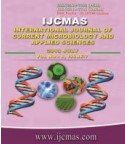


 National Academy of Agricultural Sciences (NAAS)
National Academy of Agricultural Sciences (NAAS)

|
PRINT ISSN : 2319-7692
Online ISSN : 2319-7706 Issues : 12 per year Publisher : Excellent Publishers Email : editorijcmas@gmail.com / submit@ijcmas.com Editor-in-chief: Dr.M.Prakash Index Copernicus ICV 2018: 95.39 NAAS RATING 2020: 5.38 |
The study deals with the prevalence of menopause and menopausal problems among women in Dharwad and Bagalkote districts. Through Self Help Groups (SHG) and door to door survey conducted along with concerned information among 480 respondents in eight villages from two districts. The women who experienced menopause for at least one year with age ranges 35-55 years in rural and urban areas were considered for the study. The prevalence of the study found to be 44 per cent out of 9512 contacted adult women. In urban area 76-88 per cent of women attained natural menopause in Dharwad and Bagalkote districts respectively but in Bagalokte district 23.38 per cent of them attained menopause due to hysterectomy. Most common menopausal problems included were joint and muscular discomfort (68.33%), sleep problems (51.66%), hot flushes (37.50%), sweating (6.67%) and heart discomfort (9.31%). Majority (44.17%) of the women experienced moderate level of somatic problems in both districts. The respondents had moderate to severe level of psychological problems (40%) and remaining 44 per cent experienced mild to moderate level of urogenital problems. There was a significant difference between menopausal problems it indicating that the women experienced more of somatic problems followed by psychological and urogenital problems. Age, education, occupation and socio-economic status of the respondents were negatively significantly related with menopausal problems. The study concluded that to overcome existing somatic, psychological and urogenital menopausal problems educational awareness and self-coping methods for rural and urban women are necessary.
 |
 |
 |
 |
 |